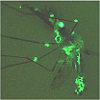
More specifically, the “proprietary bacterial consortium” helps create a biofilm that can self-regulate and has proven highly efficient at cleaning wastewater. Researchers demonstrated the system‚Äôs ability to clean wastewater within 24 hours at several city and military sites, so that less than ten percent sludge remained by volume. That contrasts with traditional septic systems that can take 30 days and leave 40 or 50 percent sludge, the researchers said.
The demo apparently impressed the Army enough to order two of the units, which arrived at Afghanistan inside 20-foot shipping containers.
“The technology is scalable,” said Sabin Holland, the lead scientist on the project. “We can make the units as large as required for large scale treatment applications, or as small as a single home unit.”
Sam Houston State partnered with the private firm PCD Inc. to create a limited liability corporation called Active Water Systems, which is managing commercialization of the bioreactors. But there’s no word so far on cost.
Microbes have done similar cleaning duty in other applications, such as a fuel cell that makes salt water drinkable and generates power in the bargain. We imagine technologies like this could go a long way toward helping renovate America’s aging infrastructure.
Popular Science has been a leading source of science, technology and gadget news since 1872. With up-to-the minute latest space news, insightful commentary on the new innovations and concept cars ...if it's new or future technology you'll find it at popsci.com.au.
WW Media - Popular Science © 2010
Cameras - Home Entertainment - Mobile Phones





